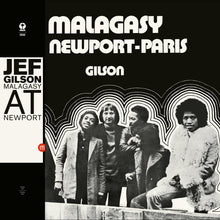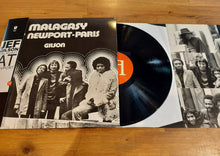SouffleContinu Records / France / 2021
In May 1972, the wave of anger and the thirst for freedom that had swept the world in 1968 arrived in Madagascar. The Malagasy youth took the opportunity to exile in search of a brighter future. Several of them, all jazz musicians and often polyintrumentalists, came to Paris with their afro hair and bellbottoms. Their names were Sylvin Marc, his cousin Ange "Zizi" Japhet, Del Rabenja, Gérard Rakotoarivony and Frank Raholison.
By chance, they crossed paths with pianist and bandleader Jef Gilson, who they had already met as kids during a series of concert and workshops in Tananarive four years earlier. Gilson was far from an unknown on the French jazz scene. He had
played with Boris Vian and André Hodeir at the end of the forties, he was one of the first French composers to move away from the New-Orleans style to try his hand at bebop, had launched numerous young stars (Ponty, Texier, Portal...), was a polemical critic for Jazz Hot, had opened for Coltrane at Antibes/Juan Les Pins, and was part of the Double Six... But it was tough to make a living playing personal compositions and Jef, who didn’t have enough money to return to the island and continue mining the seam of Malagasy jazz, saw an opportunity to relaunch ‘Malagasy’.
He had his recording studio in the Les Halles area, at the Foyer Montorgueil, where he was teaching jazz to a choir. He set to work with the new Malagasy group, working on a repertoire and reviving some of his compositions from the 50s/60s ("Requiem Pour Django", "Dizzy 48", "Anamorphose" here renamed "Salegy Jef" as a nod to an ancestral rhythm reworked in a contemporary style...), and also included more recent tunes ("Newport Bounce" which opens this current album is a
reworking of a track called "Interlude", recorded in 69 with the drummer from Miles Davis’ first quintet, Philly Joe Jones).
The group Malagasy 73 gigged a lot. One of their concerts was recorded on the 14 March in a club, ‘Le Newport’, in rue
Grégoire de Tours, Saint Germain des Prés, not far from the ‘Kiosque d'Orphée’ where Gilson worked at the beginning of
the 60s when he brought bebop and avant-garde jazz to the attention of a generation of musicians with his records
imported from USA.
This meeting between two generations and two cultures created a new mix between jazz, traditional music and electric
funk. Jef Gilson had reinvented himself yet again, and it wouldn’t be the last time.




